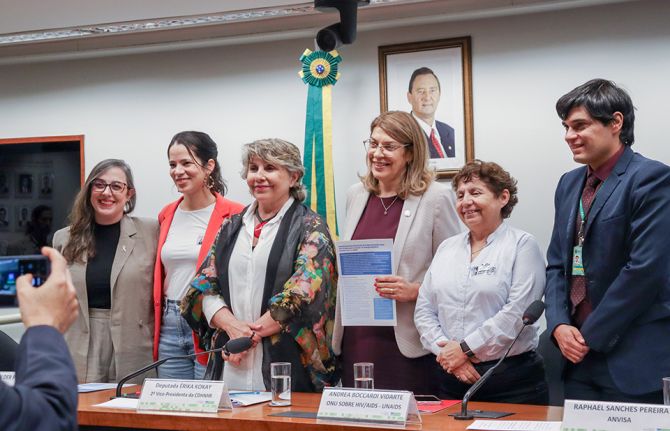
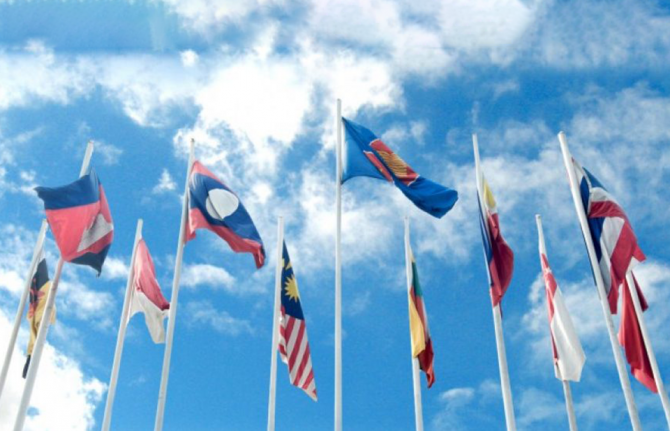
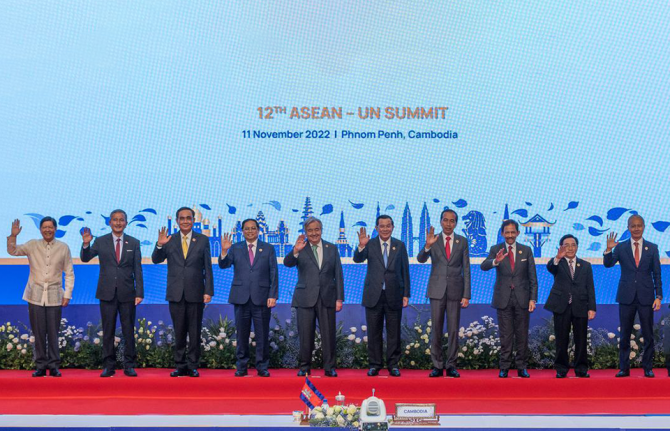
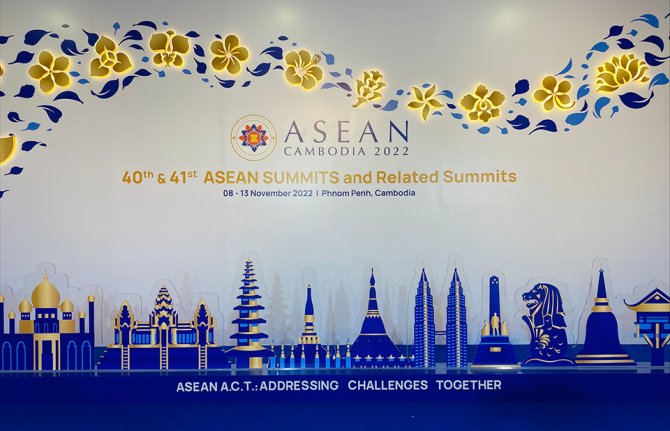
Feature Story
Ahead of World AIDS Day, ASEAN countries recommit to ending inequalities and accelerating progress to end AIDS
25 November 2022
25 November 2022 25 November 2022Member States of the Association of Southeast Asian Nations (ASEAN) have reaffirmed their commitment to accelerate progress toward ending AIDS as a public health threat by 2030.
At the 40th and 41st ASEAN Summits under the Chairmanship of the Kingdom of Cambodia, Member States pledged to strengthen community-led responses and increase financing for the HIV response. Echoing the World AIDS Day call to “equalize” the AIDS response, country leaders also agreed to a comprehensive agenda to end the inequalities stalling progress.
The ASEAN Leaders’ Declaration on Ending Inequalities and Getting on Track to End AIDS by 2030 is aligned with the 2021 UN Political Declaration on HIV and AIDS and the 2021–2026 Global AIDS Strategy and targets.
"We are now in an era where treatment and various options on HIV prevention can be made available and accessible, and it is important to shine a light on where inequalities and gaps continue to persist if ASEAN is to sustainably accomplish these targets,” said H.E. Ieng Mouly, Senior Minister and Chair of Cambodia’s National AIDS Authority.
In 2021 there were an estimated 1.9 million people living with HIV in ASEAN countries and an estimated 78,000 new HIV infections. In most ASEAN countries there are now rising epidemics among young gay men and other men who have sex with men and transgender people.
“Wherever communities are being left behind, ASEAN remains vulnerable to the social and economic fallout of HIV,” said UNAIDS Asia Pacific Regional Director, Taoufik Bakkali. “This Declaration is important and timely. It paves the way for countries to comprehensively address the large gaps in service coverage that remain in several countries, particularly for key populations.”
The ASEAN Declaration calls for focus on key and marginalized populations and explicitly addresses the needs of people living with HIV, men who have sex with men, transgender people, people who inject drugs, sex workers and their partners. It contains wide-ranging commitments, including concrete strategies to achieve the 95-95-95 testing and treatment targets. (By 2025, 95% of people living with HIV in all countries and communities to be aware of their status, 95% of all diagnosed people on treatment and 95% of those on treatment achieving viral suppression.)
End inequalities
ASEAN states have committed to better facilitate the participation of people living with HIV. They pledged to remove barriers to HIV services by improving policy and legal environments. This includes taking steps to reform discriminatory and punitive laws such as those that criminalize key populations and block adolescents from accessing HIV prevention, testing and treatment, and restrict the entry, stay, and residence of people living with HIV. Countries further agreed to take steps to eliminate stigma and discrimination against people living with HIV and key populations in healthcare, education, and workplace settings, as well as in communities.
Strengthen, support and sustain community-led responses
Governments said they would ensure the inclusion of people living with HIV, and communities most affected by HIV, in AIDS response planning, implementation and evaluation. Community organizations, and particularly community- and peer-led interventions, should be strengthened and scaled-up. States agreed to continue investing in community-led service delivery, including by adopting and implementing social contracting policies. They also promised to support community-led monitoring and research.
Finance and sustain the AIDS response
The alliance agreed to address HIV response financing shortfalls by raising sufficient domestic and international financial resources to fill gaps. At the same time, they committed to developing and implementing plans to transition from external to domestic funding. They promised to work to improve efficiency in the use of existing financial resources, including through integration with health and humanitarian responses and universal health coverage mechanisms. They also agreed to regional cooperation for research, sharing good practices, joint interventions and to strategize for improved access to health commodities.
Region/country
- Asia and Pacific
- Australia
- Bangladesh
- Bhutan
- Brunei Darussalam
- Cambodia
- China
- Democratic People's Republic of Korea
- Federated States of Micronesia
- Fiji
- India
- Indonesia
- Islamic Republic of Iran
- Japan
- Kiribati
- Lao People's Democratic Republic
- Malaysia
- Maldives
- Marshall Islands
- Mongolia
- Myanmar
- Nauru
- Nepal
- New Zealand
- Pakistan
- Palau
- Papua New Guinea
- Philippines
- Republic of Korea
- Singapore
- Solomon Islands
- Sri Lanka
- Thailand
- Timor-Leste
- Tonga
- Tuvalu
- Vanuatu
- Viet Nam
- Samoa

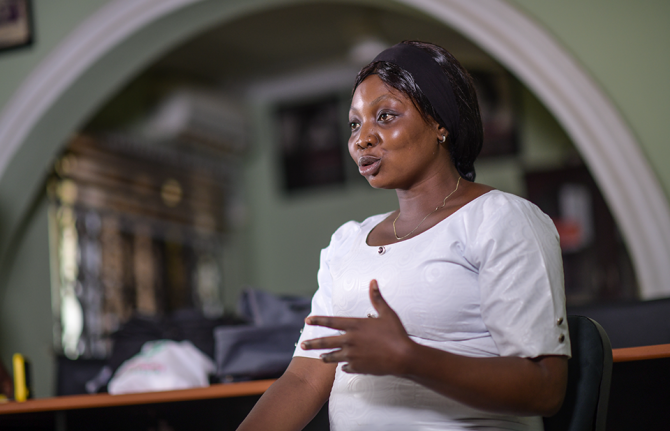
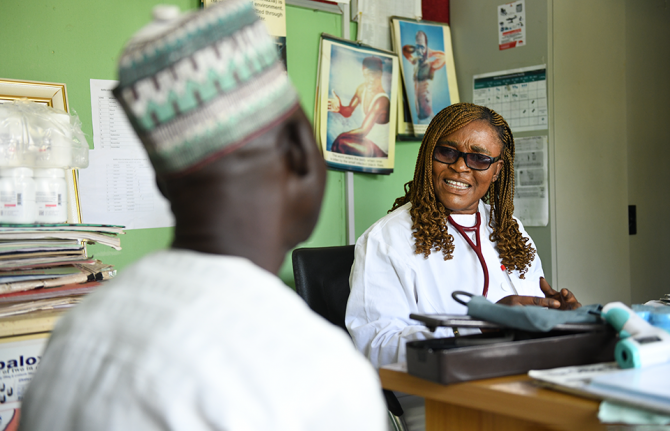
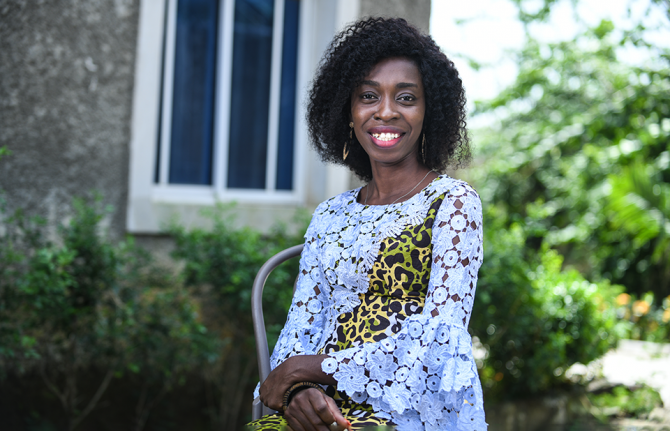
Feature Story
Dangerous inequalities and overcoming them
18 November 2022
18 November 2022 18 November 2022Grace Amodu was 7 years old when she found out she was living with HIV. Until then she had been told to take pills daily for malaria or for headaches but she grew tired of it. Screaming and kicking she told her brother that she was going to stop taking her medicine and that she wanted answers. Her mother took her aside and explained that she was born with HIV and that the treatment would keep her healthy like other kids.
She remembers crying a lot and refusing to leave the house.
To keep her from spiraling out of control her mom encouraged her to join a support group, which she says turned her life around.
As she proudly says she has two children who are both free of HIV. Taking her medication at the same time every day throughout her pregnancy and afterwards meant she was not going to transmit HIV to her babies. "When you take medicine it suppresses the virus and even though I feared my children may have HIV they both tested negative.”
She credits International Community of Women Living with HIV (ICW) Nigeria chapter for giving her hope and confidence.
“ICW was like a backbone, they were there for me like the colleagues, everyone around was standing for me, even the boss, Assumpta Reginald, was like a mother figure to me,” Ms Amodu said. “She held me by the hand telling me that, ‘You can do this and you can become a better person.’
As a result, Ms Amodu has become an HIV advocate and a community pharmacist.
"We go to the hospital and get medicine for people and give them to patients who are maybe not able to access their drugs because they have no transport fare or they are far away or due to the stigma in the hospital they don’t want to come to have nurses and doctors shout at them so we take these drugs down to their doorstep and give it to them,” she explained.
More than 90% of people living with HIV in Nigeria are on antiretroviral medicine but stigma and discrimination are still rampant.
For Ms Amodu the solution is simple. Give people the right information about HIV to break the cycle.
“We need to make people understand that you being HIV positive is not making you less of a human, you are also a human being and you deserve equal rights,” the 28-year-old said.
Stella Ebeh knows all about stigma. She started volunteering in 2004 helping people living with HIV like herself. Then she started working in a health center and became a public health officer. Over the years Ms Ebeh said she has cared for more than 7000 patients and also became a mentor-mother (giving HIV advice to pregnant women and counselling), and an anti-stigma ambassador.
She is very proud of overcoming stigma and as she called it, “walking on it,” but despairs that she is still not a full-time staff member. People living with HIV are very capable and yet we are often overlooked she said, adding, “I work like an elephant but eat like a rat.”
Patients pour in and out of the Marabara health centre on the outskirts of Abuja all day. Ms Ebeh goes from one person to another. She lingers a while with a pregnant woman who also prepares lunch on the premises, Ngozi Blessing.
Ms Ebeh insists on pregnant women taking all the precautions they can to give birth to healthy babies. Her husband and their five children are all HIV negative. Sadly, in Nigeria this is an exception.
Vertical transmission is 25% in the country - that is when a mother passes on the virus to her child during pregnancy or breastfeeding- a record high in the region.
UNAIDS Country Director Leopold Zekeng says this is unacceptable. For him it is a demonstration of the inequalities in terms of access to services.
“Two thirds of the 8 million women who get pregnant every year in Nigeria do not have access to PMTCT (prevention between mother to child transmission of HIV) services during ante-natal care,” he said.
This is why Nigeria and UN organizations along with other partners are spearheading an effort to end AIDS in children.
Dr Akudo Ikpeazu, Director and National Coordinator, National AIDS and STDs Control Programme (NASCP) said that in the last 2 years they have done an enormous amount of work first trying to get a mapping to understand where all the women are having babies and where they receive ante-natal care if at all.
“A lot of them are in birth homes, they go to traditional birth attendants and many deliver at home and receive services at home and so we have a got new strategy which aims to find them where they are, ensure that they are treated, ensure that we can find them first, ensure that we can test them, link them into treatment and count every single one that has gained access to care,” she said.
In other words, find all, test all, treat all and report all which happens to be Nigeria’s slogan encapsulating their strategy.
Once that vertical transmission tap, as she called it, is closed, then there will be a smaller pool of children to look after regarding treatment. Dr Ikpeazu said Nigeria intends to put in place an acceleration plan to have more children and adolescents on treatment and push for them to stay on treatment.
For Toyin Chukwuduzie, Director of Education as a Vaccine (EVA), HIV is one part of a larger equation.
“We see the number of unintended pregnancies, we see the burden of HIV especially among adolescent girls, we also see the sexual and gender based violence happening in our society so these things are in existence, these things are happening, yet adolescents and young people don’t have the information they need to make decisions whether we are talking about schools, whether we are talking about health facilities or even in the homes where there are other adults so there are huge gaps,” she said.
The 35-year-old works with young people to fill those education gaps and build support. She is convinced that a main driver of these gaping holes are inequalities, one in particular.
"I believe gender inequality is the root cause of many other inequalities so if had a magic wand gender inequality would be the one I would address the first because it’s key,” she said. “Addressing gender inequality is key to unlocking potential, potential of women and girls everywhere in this country.”
Hammering in her point, she added that despite everyone stressing the fact that young people are the force of the future Ms Chukwudize said, "If you are not providing that safe environment, if they are not healthy, if their dreams and aspirations are thrown off the path, how do they become the future that we want to see.”
Region/country

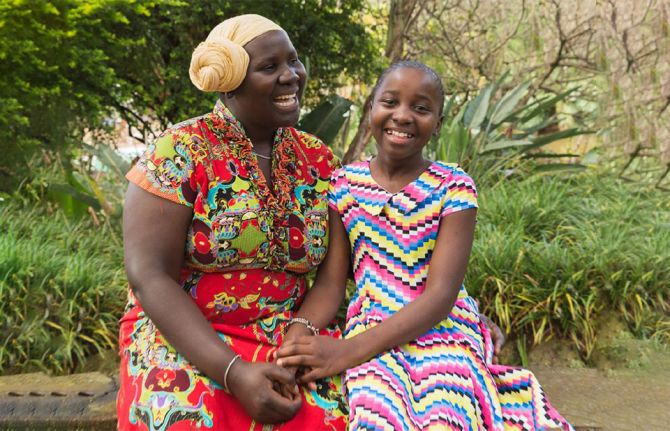
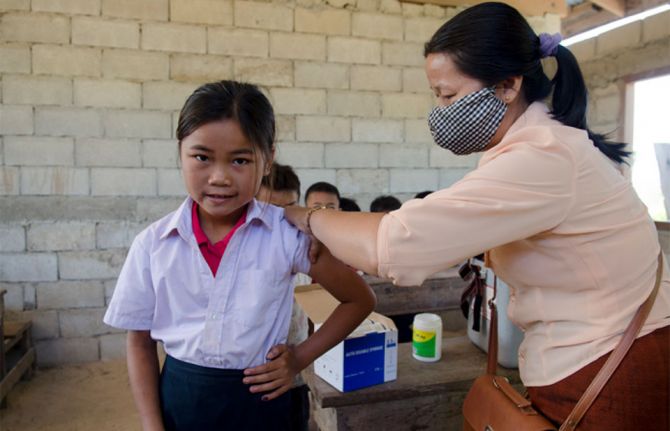
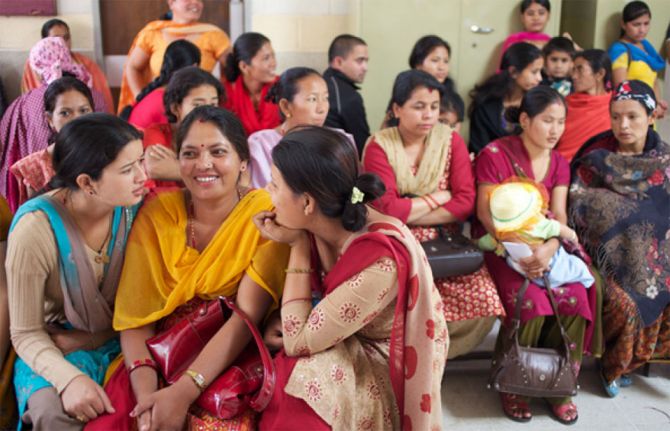
Feature Story
United for ending cervical cancer, HIV and inequities for women and girls
17 November 2022
17 November 2022 17 November 2022On this Day of Action, as we celebrate a two-year anniversary of the launch by the World Health Organization (WHO) of the Global Strategy to accelerate the elimination of cervical cancer as a public health problem, we are reminded that despite the availability of the knowledge, tools and technologies, cervical cancer still kills more than 342 000 women a year (in 2020) globally. Every two minutes one woman loses her life to cervical cancer - a disease that is preventable and curable.
The high burden of cervical cancer is driven by gender, social and economic inequalities and health disparities in access to HPV vaccines, screening, care and modern prevention and treatment technologies. Because of those inequalities, women and girls in low- and middle-income countries (LMICs) remain most affected. Nine out of 10 women who die of cervical cancer reside in LMICs. Cervical cancer is the number one cause of cancer-related death among women living in sub-Saharan Africa.
The WHO Global Strategy to eliminate cervical cancer launched by the WHO on 17 November, 2020 was supported among many by the UN partner organizations including IAEA, UNAIDS, UNFPA , UNICEF, and Unitaid. The UN Joint Action Group comprised of these six UN entities each bringing in its unique mandates and resources, is committed to supporting countries efforts in meeting by 2030 the global cervical cancer elimination targets – whereby 90% of girls are fully vaccinated against HPV by age 15, 70% of women are screened with a high-performance test between the ages of 35 to 45, and 90% of women identified as having cervical disease receive treatment. If these targets are met, 300 000 deaths from cervical cancer could be averted by 2030, 14 million by 2070, and over 62 million by 2120.
“In countries with high rates of HIV, over 50% of cervical cancer cases are reported among women living with HIV. Women living with HIV are six times more likely to develop cervical cancer and to develop it at younger age than those without HIV. It is unacceptable to claim that we have saved a woman’s life by enabling access to antiretroviral therapy for HIV alone, if we then leave her to die from cervical cancer. Our joint focus is on breaking down silos, building bridges between HIV and cervical cancer programmes, and bringing the two communities together because we know that linkages save lives.” – Winnie Byanyima, UNAIDS Executive Director
“No woman should die of cervical cancer when we have a highly effective HPV vaccine and quality diagnostics. We need prevention and early detection - this is how we ensure that this disease is eliminated globally. Governments and partners need to invest in accelerated access to resilient primary health care that delivers integrated care like routine immunization and sexual and reproductive health. And we must commit robust long-term human resources for adequate and accessible health care workers in communities and at facility level. Funding for health and health equity are prerequisites for cervical cancer elimination around the world.” - Dr Aboubacar Kampo, Director of Health Programme, UNICEF New York HQ
“We have the tools and technologies to end cervical cancer. Now it is a question of access. Unitaid stepped up the moment WHO issued its call to action, and within just a few years we have introduced effective technologies and developed screen-and-treat models that work in resource-limited settings. The last piece of the puzzle is scale up – we need to see a concerted global effort so every last woman can benefit from life-saving preventive care and we can end cervical cancer for generations to come.” – Dr Philippe Duneton, Executive Director, Unitaid
“Despite being one of the leading causes of death from cancer for women in low- and medium-income countries (LMICs), cervical cancer is also one of the most preventable and treatable cancer types. Nuclear applications such as diagnostic imaging can help detect the cancer at an early stage and increase survival rates. Radiotherapy can successfully treat women with cervical cancer, even in advanced cases. With our Rays of Hope initiative, we aim to increase access to these technologies worldwide and close the unacceptable gap of inequality.”- Najat Mokhtar, IAEA Deputy Director General and Head of the Department of Nuclear Sciences and Applications
“On this second anniversary of the Global Strategy for Cervical Cancer Elimination, the UN Joint Action Group (UNJAG)* celebrates the successes achieved. As the world population continues to grow, more girls and women will require life-saving vaccination, screening and treatment. We acknowledge the need for effective mobilization of resources and partners to achieve the 90-70-90 global elimination targets. Going forward we will continue to focus our attention and joint efforts on ensuring full prevention, high quality life-saving services and equity in access to modern technologies for women and girls across the world.” – Petra ten Hoope-Bender, UNJAG Chair, Technical Adviser Sexual and Reproductive Health and Rights, UNFPA.
* IAEA, UNAIDS, UNFPA, UNICEF, UNITAID and WHO
Related

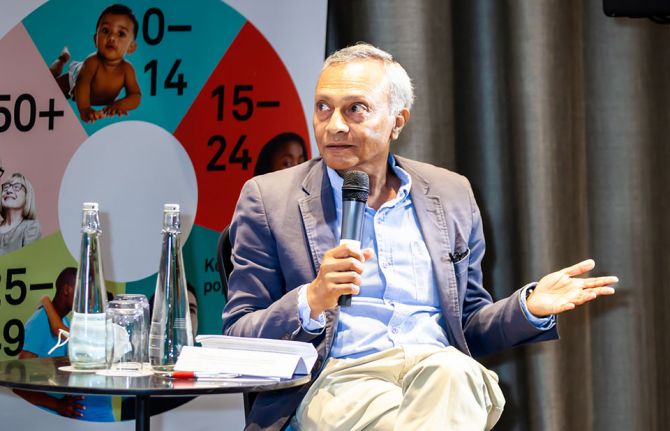

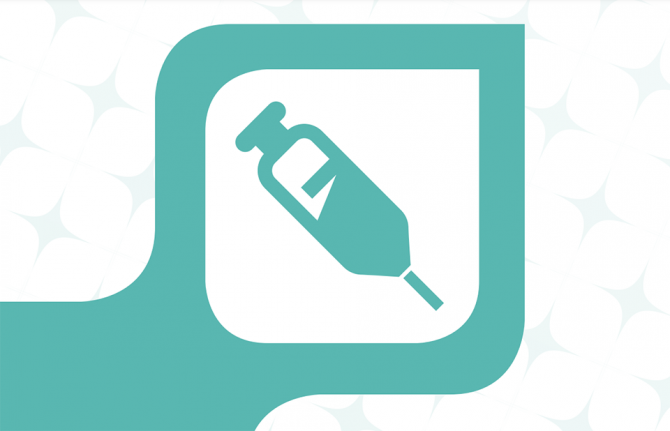
Feature Story
Delays in global, affordable access to long-acting, injectable HIV medicines would cost lives, say AIDS campaigners
16 November 2022
16 November 2022 16 November 2022GENEVA – Reflecting on 100 days since the 24th International AIDS Conference in Montreal, at which the World Health Organisation issued landmark guidance on how long-acting injectable anti-retroviral medicines can help prevent new HIV infections, and ViiV Healthcare committed to enabling access, AIDS campaigners are urging ViiV Healthcare to take vital next steps to enable timely rollout of game-changing, life-saving, long-acting injectable HIV medicine to millions of people.
At AIDS2022, the International AIDS Conference in Montreal, 29th July - 2nd August, ViiV Healthcare the manufacturer of cabotegravir (CAB-LA) committed to share technology, and ensure an affordable price, for the long-acting, injectable HIV medicine. The announcement generated international excitement as CAB-LA has been shown to be a safe and effective prevention tool. Reflecting on 100 days since then, global health leaders say there is an urgent need to for ViiV to take crucial next steps.
ViiV committed at the Conference in Montreal to lower the price for CAB-LA in a subset of low- and middle-income countries. But ViiV has not yet published this price. Advocates say the annual per person price needs to be equivalent to the price of oral PrEP, tens of dollars not hundreds of dollars. Multiple governments and financing agencies have indicated their interest in purchasing CAB-LA for PrEP if the medicine is offered at an affordable price point. Advocates are calling on ViiV to transparently and rapidly share details of their planned pricing strategy.
“ViiV Healthcare needs to publicly announce an interim pricing strategy, which prioritises affordability so countries and procurement bodies can plan and purchase at scale,” said Dr Yogan Pillay, South Africa country director at The Clinton Health Access Initiative. “Governments and other procurers will only purchase long-acting injectable HIV medicines at scale if the drugs are affordable and if there’s a clear timeline as to when the drugs will be available.”
While ViiV’s commitment to facilitate the generic production of CAB-LA via an agreement with the Medicines Patent Pool for use in 90 countries is helpful, HIV experts are calling on ViiV to allow an expansion of the number of countries eligible in order to accelerate progress in supplying the product to those in need. Although the current set of 90 countries includes both low- and middle-income countries, it excludes dozens of other middle-income countries, amongst which are countries with high rates of HIV infection. Expanding the list of countries would help incentivise generic production by expanding the potential market size.
“ViiV Healthcare should allow generic production and supply in all low- and middle-income countries,” said Lilian Mworeko, Executive Director, International Community of Women Living with HIV East Africa. “Anything short of this would mean that millions of people who need these products would not be able to access them for years to come. Every day of delay would represent failure to prevent the spread of HIV and takes us further away from ending AIDS by 2030.”
“At the AIDS Conference in Montreal, ViiV took important first steps to enable this powerful new prevention tool to reach many in need. It is now time for ViiV to take additional courageous steps. These include ensuring registration with medicines agencies in all the countries with the highest rates of HIV, announcing the low price and expanding the set of countries allowed in the generic market. Bold actions by ViiV in this moment could help save millions of lives,” said Matthew Kavanagh, Deputy Executive Director, a.i. at UNAIDS.
Long acting ARVs need to be made available!

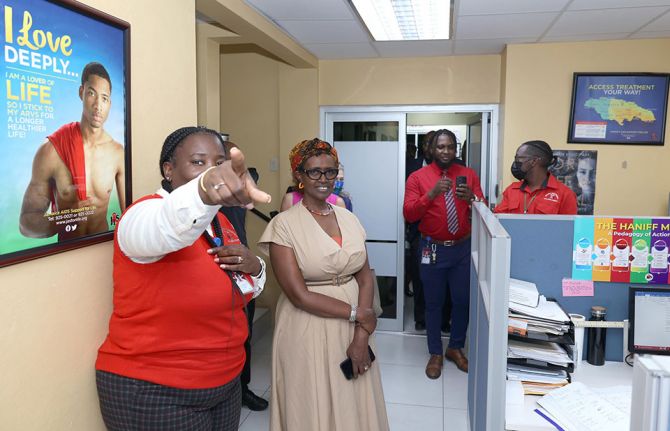
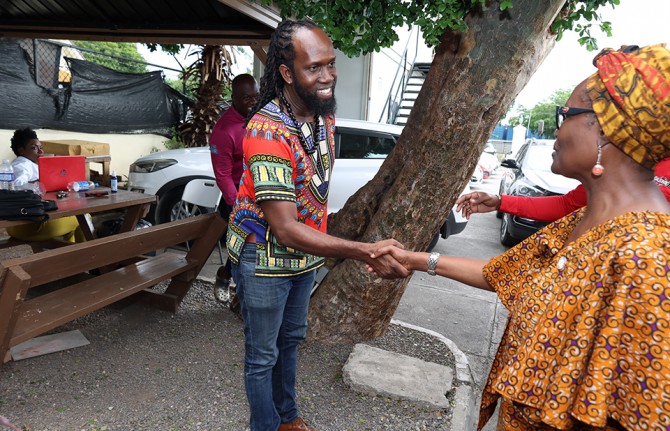
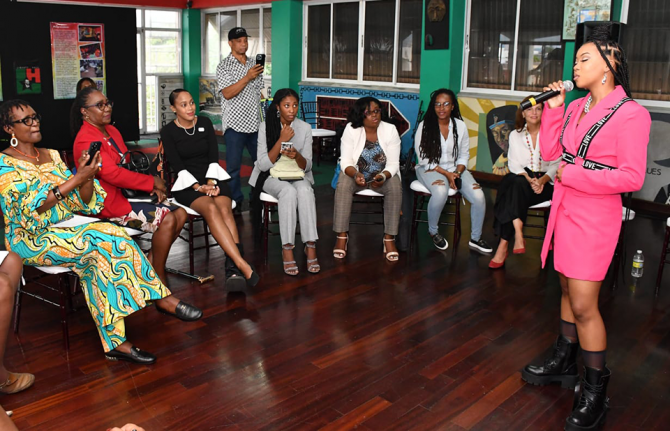
Feature Story
“I am confident that Jamaica can end AIDS”
15 November 2022
15 November 2022 15 November 2022Following a five-day visit to Jamaica to see first-hand the extraordinary work of joint efforts by the government, partners and communities to end AIDS, UNAIDS Executive Director Winnie Byanyima issued the following statement:
“I have observed strong political commitment and country ownership in Jamaica’s response to HIV. I also witnessed the active contribution and engagement of civil society and communities living with or affected by HIV. Your dedication and commitment give me hope that Jamaica and the wider Caribbean region can end AIDS.
However, there are barriers to overcome, these include addressing inequalities, eliminating stigma and discrimination, ending punitive laws which harm the AIDS response, and eliminating gender inequalities, including gender-based violence. In all my engagements with senior government officials, civil society and international development partners, I have shared four vital recommendations to overcome inequalities and ensure a sustainable response to HIV:
- Getting the data right—and using the evidence to ensure access to HIV services for everyone who needs those services, free of stigma and discrimination
- Improving governance and coordination for a truly multisectoral and multidisciplinary HIV response
- Ending gender-based violence – and especially sexual violence
- Increasing fiscal space and efficiently investing in what works
More investment is needed to end persistent structural barriers and develop anti-discrimination legislation. Social contracting schemes need to be implemented with civil society, which will be transformational in delivering community-level services. Health systems must be strengthened to deliver people-centred services more efficiently and more cost-effectively, which is also crucial for pandemic preparedness.
As the Executive Director of UNAIDS my commitment is to intensify and expand support from our 11 Cosponsors to end AIDS in Jamaica and across the Caribbean. In supporting efforts to increase access to HIV prevention and treatment services and in ensuring an enabling environment where people feel safe in accessing those services.
UNAIDS will support efforts to integrate HIV into other health services, especially at the primary health care level, without compromising the quality of HIV services being delivered. UNAIDS further commits to strengthening partnerships with our stakeholders in the region and ensuring effective coordination of our efforts.
We will also work with the President’s Emergency Programme for AIDS Relief (PEPFAR), the Global Fund to Fight AIDS, TB and Malaria, and the Pan-American Health Organization (PAHO) to strengthen data systems and ensure a response which is evidence based and which reaches the people most in need. UNAIDS will also continue to work with partners to mobilize resources to support Jamaica’s efforts to fight HIV.
Jamaica is making progress. But I know Jamaica can move faster and reach the 15 000 people living with HIV, including over 300 children, who are currently not accessing HIV treatment.
We only be able to end the HIV pandemic, or indeed any other pandemic, when human rights are respected and when everyone is supported in accessing the health and social services they need.
I thank the Government of Jamaica, civil society and everyone who made my stay in the country an exciting one. I salute all of you for your tireless efforts and your ongoing work. We are making progress. Let's get everyone who is not on treatment on treatment. Let's eliminate vertical transmission. I am confident that Jamaica can end this fight. UNAIDS is here to support you. We can – we will – end AIDS in Jamaica and the Caribbean.”
Region/country
Related

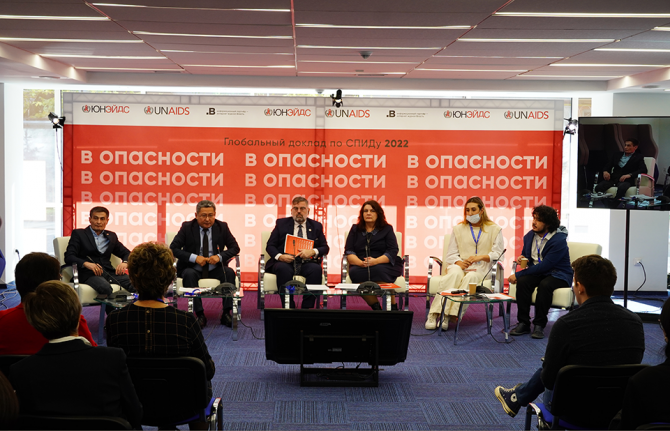
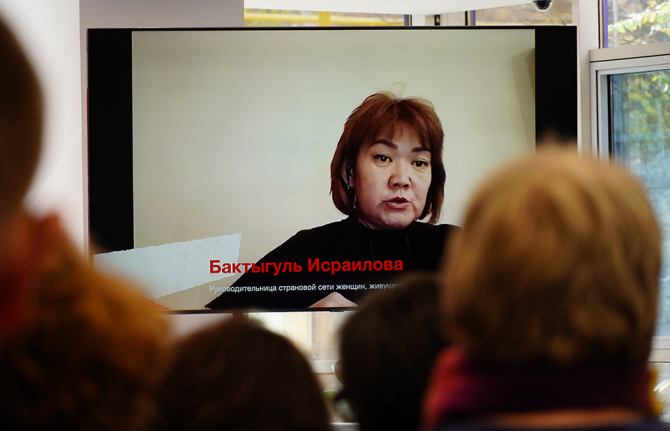
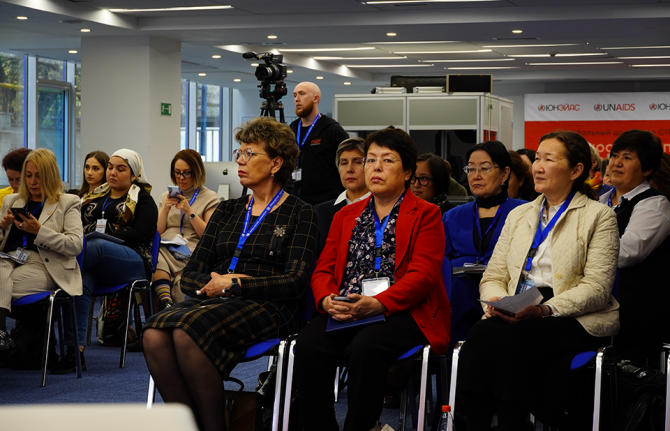
Feature Story
Eastern Europe and Central Asia may face an accelerated increase in new HIV infections and AIDS-related deaths because of the humanitarian crisis gripping the entire region
28 October 2022
28 October 2022 28 October 2022Global shocks, including the COVID-19 pandemic and the war in Ukraine, have further exacerbated risks for the HIV response in Eastern Europe and Central Asia. The growing HIV epidemic and several waves of migration and refugee crises in the region require urgent and considerable efforts to ensure access to essential HIV services for all people in need. Officials and community representatives from several countries of the region have discussed how to address those challenges using the recommendations of the new Global AIDS Report “In Danger’ during the launch of the Report in Almaty, Kazakhstan.
When the Republic of Moldova faced the first wave of refugees from the war in Ukraine, with 500 000 people passing through within the first few months, there was not much time to prepare.
Svetlana Popovichi, National Treatment Coordinator in the Republic of Moldova, explained: “The Government prepared a legislative framework so that all people, regardless of their residence and available documents, have access to necessary HIV services. Civil society and community organizations worked day and night to connect us to people in need. Together with partners, despite the huge flow, we provided all the necessary services, including PrEP and treatment for pregnant women. We were able to quickly redesign our treatment plans so that everyone—our people and refugees—living with HIV had equal access to treatment and services.”
“This is our universal recommendation for countries in crisis,” said Gabriel Ionascu, UNAIDS Country Director in Kazakhstan. “All people, including foreigners, have to have access to HIV services, otherwise the infection will spread further.”
According to Azamat Dysenov, Director of the Treatment Department in the Ministry of Health of Kazakhstan, the availability of antiretroviral medicines for Kazakhstan citizens living with HIV in the country is 100%. Treatment and prevention programmes are funded from the state budget and available for all Kazakh people free of charge. He said: “Today we are facing new challenges, including active migration movements. We are ready to strengthen cooperation with neighbouring countries, maximize the potential of civil society, and work together to remove barriers to access to HIV services for all who need them.”
“Stigma and discrimination towards people living with HIV and other vulnerable groups, which are worsening during the humanitarian crisis, continue to be the major block to an effective response to the HIV epidemic in this region,” said Eamonn Murphy, UNAIDS Deputy Executive Director and Regional Director for Eastern Europe and Central Asia. “HIV transmission, exposure and nondisclosure are criminalized in all countries. While the majority of countries have decriminalized same-sex sexual relations, stigma against gay men and other men who have sex with men remains common.”
According to the UNAIDS Global AIDS Update: In Danger, in 2021, 160 000 [130 000–180 000] people were newly infected with HIV in Eastern Europe and Central Asia, a 48% increase since 2010. The number of AIDS-related deaths in the region in 2021, at 44 000 [36 000–53 000], is 32% higher than in 2010, despite expanding HIV treatment coverage and availability of new prevention methods and measures to control opportunistic infections. According to UNAIDS, in 2020, 54% of new HIV diagnoses in the region were detected at the late stage (CD4+ <350 cells), which is 10% more than in 2018.
Amir Shaikezhanov, an activist and AmanBol Project Director in Kazakhstan, said it is important to remember “there are people behind these facts and figures. Stigma is difficult to measure, but it hugely impacts access to HIV services for different groups. My friend just recently died from AIDS because he was not ready to disclose his gay status and HIV-positive status, even to doctors.”
The “transgender community has been excluded and not visible for a long time. It is great that the report pays attention to this group, including to a high level of stigma towards transgender people,” said Victoria Primak, a transgender activist in Kazakhstan.
According to the UNAIDS report, COVID-19 exposed an epidemic of violence against women across the region. Baktygul Ismailova, Director of the Network of Women Living with HIV in Kyrgyzstan, emphasized that women living with HIV need protection from violence at all levels.
The report’s recommendations for the region include maximizing the availability of community-led, people-centred services; removing punitive and discriminatory laws, especially those criminalizing HIV and people from key populations; national action; and international solidarity in providing sustainable financing.
“Over the past two years, community organizations have proven their ability to adapt quickly to new challenges, address problems quickly in crisis situations, and provide people with the necessary HIV services. We are ready to take on all the work of providing services to key groups. We have people, experience, knowledge and understanding of what exactly and how exactly needs to be done. Give us this opportunity!” urged Nurali Amanzholov, Leader of the Central Asian Association of People Living with HIV.
Recent developments in the region, including the war in Ukraine, massive waves of refugees and migration, humanitarian challenges and economic slowdown, bring additional challenges in providing HIV and other health-care services to all people in need and ensure sustainable financing. Domestic funding for the HIV response in the region may slow down, and countries that still depend on international resources will not be able to ensure the sustainability of AIDS programmes.
“Consolidated efforts of countries and increased support from the international community are urgently needed,” said Eamonn Murphy.
Watch: launch event (English interpretation)
Watch: launch event (Russian)
Region/country
- Eastern Europe and Central Asia
- Albania
- Armenia
- Azerbaijan
- Belarus
- Bosnia and Herzegovina
- Bulgaria
- Croatia
- Cyprus
- Czechia
- Estonia
- Georgia
- Hungary
- Kazakhstan
- Kyrgyzstan
- Latvia
- Lithuania
- Montenegro
- Poland
- Republic of Moldova
- Romania
- Russian Federation
- Serbia
- Slovakia
- Slovenia
- Tajikistan
- North Macedonia
- Türkiye
- Turkmenistan
- Ukraine
- Uzbekistan
Related


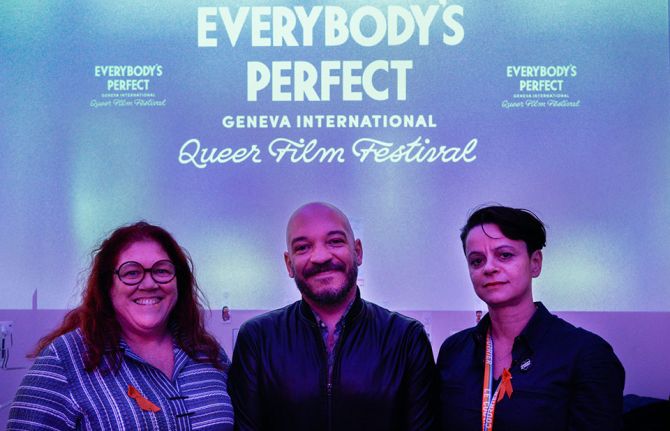


Feature Story
The First Fallen but We Will Overcome
03 November 2022
03 November 2022 03 November 2022Standing outside of the cinema house, Rodrigo de Oliveira felt exhilarated by his attendance at more than 40 film festivals around the world to promote his HIV-themed feature film, “The First Fallen.”
“A sense of community is an abstract thing but I have seen the faces of many LGBTQI people during my tour,” he said. “And in a way that is what I tried to show in my movie.”
The film opens on New Year’s eve in 1983. A young man is back in his Brazilian hometown having returned from Paris. He is feeling a bit gloomy and distant. He fears he has come down with something. There are rumblings of an unknown illness but AIDS or HIV is never mentioned until the last scene. De Oliveira chronicles the slow unravelling of the young man’s health who “disappears” and hides in a country house. He is joined by a transgender woman and another acquaintance also feeling ill. They get various pills from a boyfriend in Paris. Some are early anti-retroviral pills but there are also vitamins and shark fin pills. All three despair at being struck down by a random disease.
“For me there is hope in knowledge, that is fundamental, but as you can see community and support are key to overcome anything,” Mr de Oliveira said.
Rubbing his bald head with his hand he reflected that after seven feature films, this was his first one addressing LGBTQ and HIV issues.
"It took longer for my films to come out of the closet than myself,” he said. “In 2021 I was still fresh-faced on the scene as an out gay man and I lost people to AIDS so this felt like a responsibility to the people I saw disappear in my life.”
Born in 1985, Mr de Oliveira said he thought about HIV every week of his life. For him (as shown in the film) HIV meant death in the 80s and 90s. Since life-saving HIV treatment became readily available, living a healthy life with HIV has become the norm.
Mr de Oliveira explained that during one film screening young people did not know what it meant when two of the characters in his movie showed signs of Kaposi’s Sarcoma (flat, discolored reddish patches on the skin, an indication of cancer triggered by a weak immune system in people living with HIV who are not taking medicine.)
“It was a shock for me this gap in knowledge,” he said. Showing a slice of life from the mid-80s in his native country made even more sense to him following that conversation.
“The LGBTQI community is so used to being left out, we have to document ourselves and this is a testimony of this,” Mr de Oliveira said. “My film with its three main characters approach their ‘random illness’ differently...one is a fighter, the other an archivist and the third an artist/scientist,” he explained.
The three perspectives were important for him to document the fear, the dread and the conscious effort to overcome the crisis. By barely mentioning HIV, de Oliveira wanted to illustrate the ‘grand silence’ around the illness at the time.
In one scene, the young man’s sister demands to see her brother in a run-down clinic but she is frozen out with staff saying, ‘shame will close them down.’
“I wanted to talk about the stigma and discrimination, but I could not imagine staging actual aggression,” he said.
Suki Beavers, UNAIDS Director of Gender Equality, Human Rights and Community Engagement, who shared the stage with Mr de Oliveira at a recent film screening in Geneva during the Everybody’s Perfect film festival, said that the movie reflected people’s lack of rights. And that intersecting inequalities like being poor or being transgender or being gay or not having gone to school only compounded the hardships (the transgender character is fuming at being thrown off a bus after an altercation in one scene.)
“You see a clear violation of rights in Brazil during the 80s as well as activism to reclaim those rights,” she said. “This phenomena is still very much alive in many parts of the world to this day, which is why we cannot give up on the fight to end AIDS.”
Mr de Oliveira added that despite his film’s more sombre note, he wanted people to walk away with the feeling that love is universal. “The kiss between budding friends exemplifies that we will overcome,” he said.
He said that he would like to do two more feature films focusing on the evolution of the AIDS response like chronicling the 90s and then the last two decades.
“It takes me four to five years to make a film but know that I am on the same page as UNAIDS... ending AIDS,” he said. “I just wish I could make a film a day like you save a life a day.”
Watch trailer
Region/country
Related

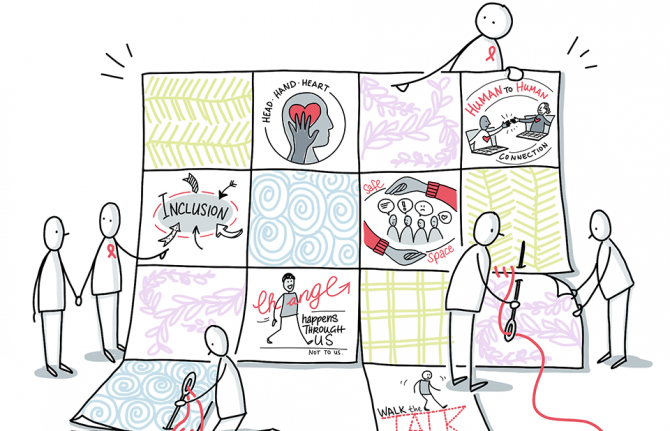
Feature Story
A Quilt in the Making: UNAIDS shares learnings from its journey of Culture Transformation
26 October 2022
26 October 2022 26 October 2022To help reflect on the progress made and the work still under way in the process of Culture Transformation, UNAIDS has produced a new brochure that is being shared with staff, stakeholders and other UN organizations.
The brochure, Building a Workplace Culture of Equality—a Reflection on UNAIDS Culture Transformation Journey to Date reviews some of the processes undertaken since 2020 to build an equal, safe and empowering workplace culture. UNAIDS Culture Transformation is grounded in feminist thinking and practice and supports UNAIDS staff through a change process, helping them to develop positive working practices that can be taken forward and embedded within organizational policy and practice.
Back in 1996, UNAIDS became the only Joint Programme of the United Nations. The small team grew over the years leading and inspiring the world to achieve its vision of zero new HIV infections, zero discrimination and zero AIDS-related deaths. Currently, some 650 staff members from over 120 nationalities work across 80 duty stations to end AIDS as a public health threat as part of the Sustainable Development Goals. In 2018, an external review noted the need for action to transform organizational culture to ensure an empowering and inclusive workplace.
The two-person team leading the work along with dedicated change agents inspired themselves with the powerful NAMES Project AIDS Memorial Quilt to visually show the key concepts essential to an empowering culture. The original AIDS quilt had stitched names on tiles to recall the lives of people who had died of AIDS-related illnesses and to honour them. The quilt became a beloved symbol for friends and family to remember their loved ones since social stigma had denied many people a proper remembrance.
The UNAIDS Culture Transformation team created its own virtual quilt showing the long-term journey necessary to transform and sustain a culture of equality and social justice.
“We have been so inspired by the determined work of staff across the organization to advance building a culture of equality,” said Mumtaz Mia and Juliane Drews who have led UNAIDS Culture Transformation. “We have been so moved by the lessons learnt in the process of change and hope that taking stock will help staff as they continue to pursue this journey.”
In other words, keep adding tiles to the UNAIDS quilt.
All of UNAIDS Cultural Transformation documents can be downloaded here.
Read Juliane and Mumtaz’s very powerful and personal OpEd in IPS News.
Related

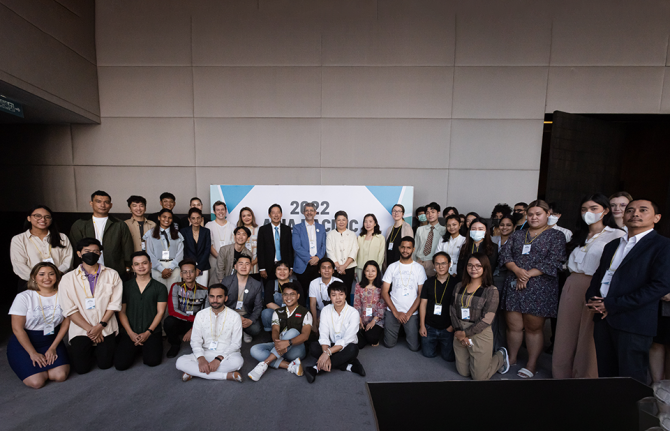
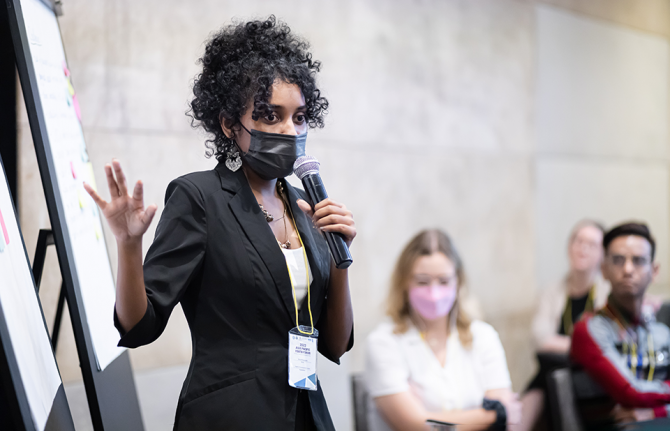

Feature Story
Asia-Pacific youth demand robust action to lower the HIV risk of young key populations
25 October 2022
25 October 2022 25 October 2022Youth advocates from 14 countries have called on governments and development partners in the Asia-Pacific region to adopt a comprehensive approach to addressing the high HIV risk now borne by young key populations. (Key populations are groups that are particularly vulnerable to HIV. They include men who have sex with men, people who use drugs, sex workers and transgender people.)
Held on October 20 and 21 in Bangkok, the 2nd Asia Pacific Youth Forum was co-organized by the Thailand Ministries of Public Health and Foreign Affairs, the UNAIDS Regional Office for Asia and the Pacific and Youth LEAD. Among other priorities, delegates advocated for more youth leadership, equitable access to quality and youth-friendly healthcare services, stronger strategies to tackle stigma and discrimination and increased access to funding for youth-led and key population programming.
UNAIDS data reveal that in 2021 there were an estimated 260 000 new HIV infections in Asian and Pacific countries. According to a recent report by UNAIDS, UNICEF, UNFPA and Youth LEAD, young people aged 15–24 years accounted for 26% of these cases. In some countries including Cambodia, Indonesia, Laos, the Philippines and Thailand, more than 40% of new infections were among youth. HIV transmission to young people rose for seven countries in the region since 2010—Afghanistan, Fiji, Malaysia, Pakistan, Papua New Guinea, the Philippines and Timor-Leste. Strikingly, in the 15 - 24 age-group, almost all (99%) new infections regionally were among people from key populations and their partners.
“Preventing HIV, STIs and all emerging diseases among young people requires addressing the root causes that put young people at risk, including gender-related, socio-economic inequalities, and stigma and discrimination,” said Mr. Satit Pitutacha, Thailand’s Deputy Minister of Public Health.
Ms Eksiri Pintaruchi, Director-General of the Department of International Organizations in the Thailand Ministry of Foreign Affairs highlighted the work of the Thai Network of Young People Living with HIV including providing peer support for young key populations, linking them to services, offering life skills training, mental health support and psychosocial care.
UNAIDS Asia and Pacific acting Regional Director, Mr Taoufik Bakkali said: “We need to address the inequalities that create vulnerability. By investing in youth today we will not only achieve a win for the HIV response, but also significant progress for the Sustainable Development Goal agenda.”
Youth LEAD’s Project and Networking Officer, Legee Tamir, noted the crucial need to increase spaces for youth leadership, especially as young key populations are still left behind in national, regional and global decision-making spaces where their voices would make a difference.
On day one of the forum youth delegates convened to share experiences. They noted legal and policy barriers including the age of consent, concerns about privacy and confidentiality and stigma and discrimination among healthcare providers. The opening hours of public clinics are not convenient for young people and services are not tailored to meet their needs.
The consultation resulted in nine recommendations which were presented to government and development stakeholders on the forum’s second day. They are as follows:
- Strengthen the leadership and meaningful engagement of young people, including young key populations and young people in all their diversity, within the HIV response
- Increase awareness about existing HIV and sexual and reproductive health and rights programmes for young key populations
- Engage and collaborate with stakeholders (including governments, the private sector, communities, media) in advocacy campaigns
- Ensure equitable and convenient access to HIV services, including for youth in rural areas, and modernise HIV services
- Tackle harmful stigma and discrimination in household, education and healthcare settings through funding and partnering with efforts led by young key populations that address deeply rooted traditional beliefs and practices
- Review and reform laws and policies that affect young key populations and ensure they are aligned with international human rights norms and recommendations
- Ensure the availability and accessibility of quality, youth-friendly and non-discriminatory programmes and services that ensure the mental wellbeing of young key populations
- Invest in the organisational strengthening and sustainability of youth-led organisations at different capacities
- Empower youth-led organisations and create more conducive, flexible and simpler processes to access opportunities for external and domestic funding
UNAIDS and its regional partners through the Asia Pacific Inter Agency Task Team on Young Key Populations will use this set of recommendations to inform future initiatives for young key populations in the region.
Region/country
- Asia and Pacific
- Australia
- Bangladesh
- Bhutan
- Brunei Darussalam
- Cambodia
- China
- Democratic People's Republic of Korea
- Federated States of Micronesia
- Fiji
- India
- Indonesia
- Islamic Republic of Iran
- Japan
- Kiribati
- Lao People's Democratic Republic
- Malaysia
- Maldives
- Marshall Islands
- Mongolia
- Myanmar
- Nauru
- Nepal
- New Zealand
- Pakistan
- Palau
- Papua New Guinea
- Philippines
- Republic of Korea
- Singapore
- Solomon Islands
- Sri Lanka
- Thailand
- Timor-Leste
- Tonga
- Tuvalu
- Vanuatu
- Viet Nam
- Samoa

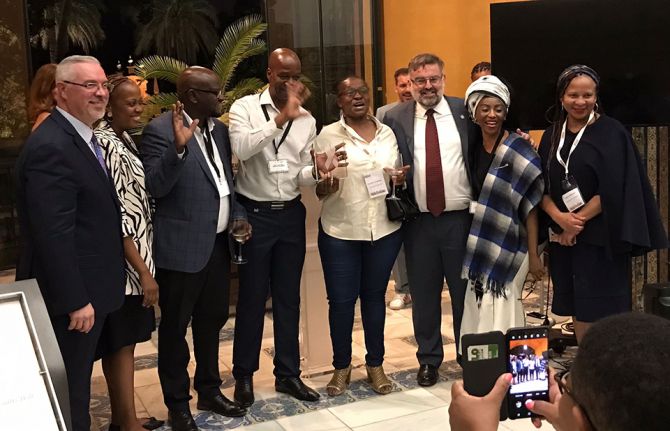
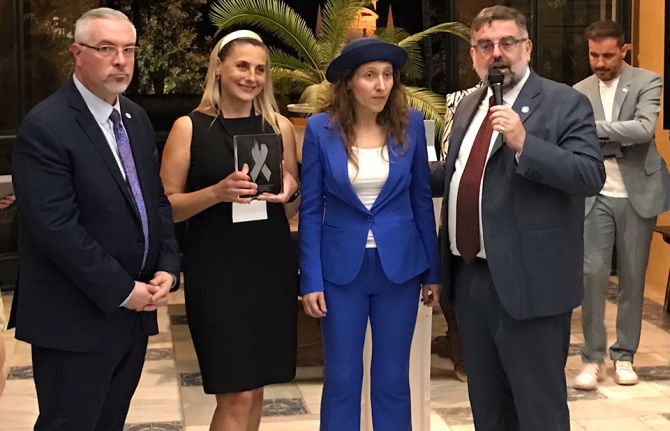
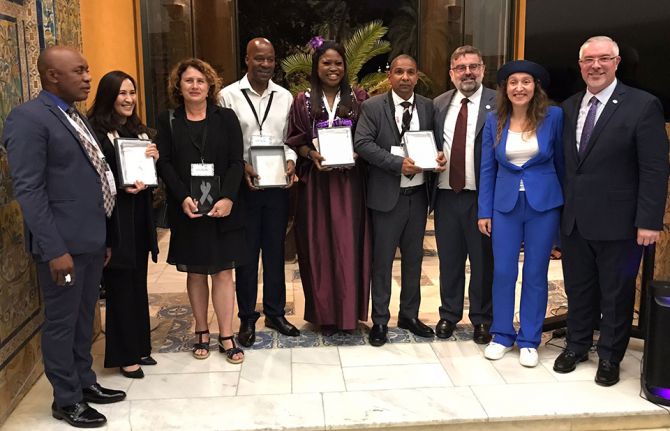
Feature Story
Six cities and a Ukrainian community-led organization recognized at Fast-Track Cities 2022 Conference
11 October 2022
11 October 2022 11 October 2022At a Fast-Track Cities 2022 conference reception held today in Seville, Spain, six Fast-Track Cities and 100% Life, a Ukrainian community-based organization, received 2022 “Circle of Excellence Awards” and the “Community Leadership Award,” respectively, in recognition of their political, public health, and community leadership.
Earlier this year, the International Association of Providers of AIDS Care (IAPAC) and Fast-Track Cities Institute (FTCI), in collaboration with the Joint United Nations Programme on HIV/AIDS (UNAIDS), launched a nomination process to identify cities from six geographic regions whose work exemplifies the Fast-Track Cities mission. Both IAPAC and UNAIDS are core partners of the Fast-Track Cities initiative, which was launched in 2014 and today comprises more than 400 cities engaged in ending their urban HIV epidemics by 2030. The six cities selected to receive the 2022 “Circle of Excellence Awards” include:
- Asia-Pacific: Quezon City, Philippines
- Europe: Amsterdam, Netherlands
- Latin America/Caribbean: Kingston, Jamaica
- North America: New York City, NY, USA
- Southern/Eastern Africa: Johannesburg, South Africa
- Western/Central Africa: Lagos State, Nigeria
The Mayors of Quezon City (Ms. Ma. Josefina Belmonte), Kingston (Mr. Delroy Williams), and New York City (Mr. Eric Adams) accepted their cities’ 2022 “Circle of Excellence” awards in-person (Mayors Belmonte and William) and via video (Mayor Adams). Public health department officials accepted awards on behalf of Amsterdam, Johannesburg, and Lagos State.
100% Life was recognized both for its efforts during the ongoing war in Ukraine, as well as that of other community-led organizations in that country who have advanced humanitarian and public health efforts on behalf of Ukrainians living with and affected by HIV. Ms. Valeria Rachynska, who is Human Rights, Gender, and Community Development Director at 100% Life, accepted the 2022 “Community Leadership Award” on behalf of her organization and partner organizations across Ukraine.
“Political, public health, and community leadership are at the heart of the Fast-Track Cities movement and are integral to averting AIDS-related deaths, stemming new HIV infections, and eliminating HIV-related stigma,” said Dr. José M. Zuniga, President/CEO of IAPAC and FTCI, which launched the two awards at the Fast-Track Cities 2021 conference. “Congratulations to 100% Life and the six cities honored for their exemplary leadership. May they serve as an inspiration for other community-led organizations and cities as they respond to their urban HIV epidemics with bold leadership.”
“Among the lessons that we have learned in tackling HIV is the need for bold political leadership, global solidarity, ensuring communities are at the center of the response, and a commitment to human rights. This has been true for COVID-19 and will be true for other pandemics to come,” said Winnie Byanyima, Executive Director of UNAIDS. “Ending inequalities is the most effective way to ensure that we are more prepared for the next pandemic. We look to city leadership to do this.”
In 2021, the “Circle of Excellence Awards” recognized five Fast-Track Cities: Bangkok, Thailand; London, England, UK; Nairobi City County, Kenya; San Francisco, CA, USA; and São Paulo, Brazil. The 2021 “Community Leadership Award” recognized GAT, a community-led organization providing health and social services to people living with and affected by HIV in Portugal.










